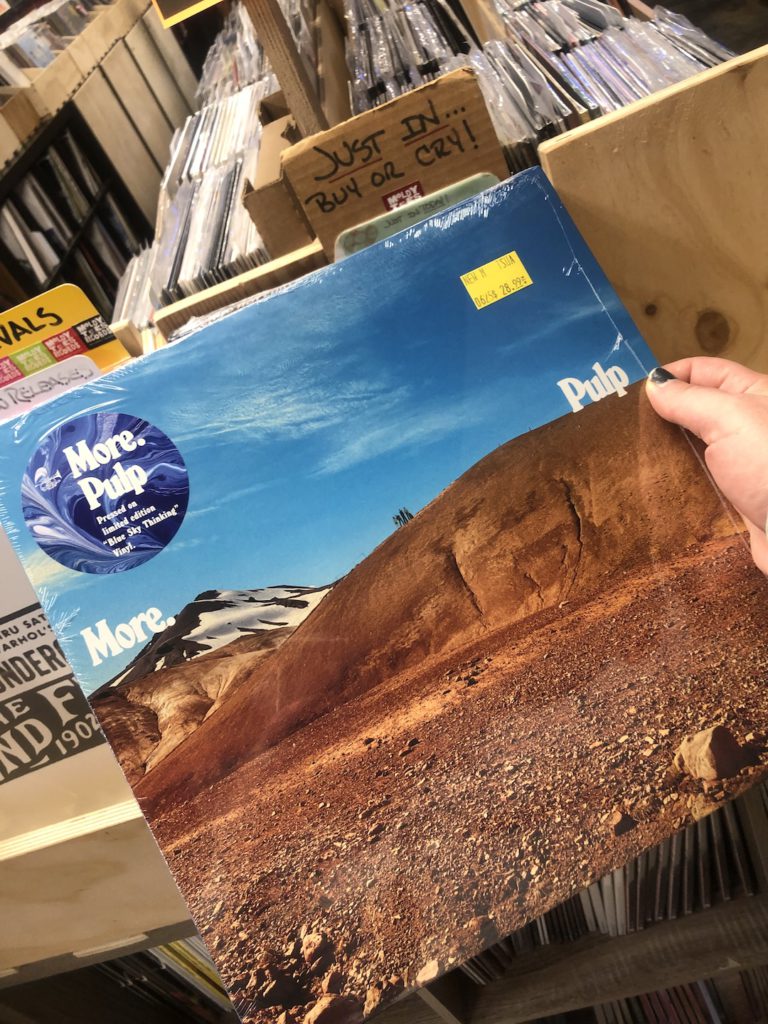
Every time I hear “Got to Have Love,” I have to stop what I’m doing and dance. The second single from More., the first new full-length Pulp album in 24 years, is a northern soul-style stomper. Like the Four Seasons songs “The Night,” which Pulp covered many years ago, and “Beggin’” it has a beat that pushes you to dance harder and faster, to kick and spin and drop to the ground. And if the song itself doesn’t quite compel you to do all these things, the video, comprised of footage from the legendary U.K. club Wigan Casino, will. By the song’s end, you should feel some kind of relief. Maybe the weight of the world has lifted. Maybe you’re just overjoyed that you got through the song without pulling a muscle.
I’m nearly two weeks late on reviewing More., but I’ve been busy doomscrolling. You probably were busy doomscrolling too. It’s been one of those weeks or months or years. I don’t know anymore. The album has already hit number one in the U.K., but I’m writing from Los Angeles for an audience that’s mostly in the same city, so I’m going to assume that there are still plenty of people who swoon for Jarvis Cocker and have yet to listen to the album.
I kind of heard More. on the way back from Arizona the weekend of its release, but I can’t remember how much of the album played and it wouldn’t really matter anyhow. The drive from Phoenix to L.A. is close to six hours and, at some point, the road trip music blurred together with the hours-long stretch of desert views and the images of Roadrunner escaping Wyle E. Coyote that played on a loop in my brain whenever I wasn’t doomscrolling. So, for the purposes of this review, I didn’t actually sit down and listen to More. until the day after a work trip to San Clemente, where I purchased a copy inside a record store that’s walking distance from the beach. This is somewhat important to note because, while I usually recommend listening to music on whatever format is most accessible to you, More. is 100% worth seeking out on vinyl.
Don’t get More. on vinyl for nostalgic purposes— Pulp’s heyday was peak CD era, so that wouldn’t make sense— get it because it’s a well-designed piece of physical media. Something I’ve always admired about Pulp is that they are a whole-package band. From their font choices to their wardrobe, they’ve developed this visual language that’s always teetering on retro, but still lives in the moment in which the album was made. It’s the aesthetic equivalent of the band’s music and, fortunately, something they have retained for their first new album of the streaming era.
In fact, with More., Pulp gave us a much-needed gift that is antithetical to the life caught in the perpetual stream and endless scroll. This isn’t passive entertainment. It’s an album that needs to be studied. Eventually, you’ll catch that “Grown Ups” references “Tina,” the song that immediately precedes it on side one, or that Cocker quotes Monty Python and the Holy Grail on “Farmers Market” and a really famous 1970s Coke commercial on “Sunsets.”
If you listen while reading the lyric sheet or detailed liner notes, you might come up with allusions to previous Pulp albums. I think that there are more on here than what I’ve picked up on after a handful of listens, so I think we should all compare notes on this one.
Ultimately, I think the whole album, and maybe Pulp’s discography, comes together on “Got to Have Love,” which is one of two songs co-credited to Steve Mackey, the band’s late bassist to whom the album is dedicated. The song is packed with Jarvisisms, from the completely unsexy reference to sex (“without love, you’re just jerking off inside someone else”) to the spoken word bridge to spelling out “L- O-V-E.”
Although the production and messages are quite different, “Got to Have Love” is a similarly urgent call-to-arms that “Mis-Shapes” was thirty years ago. This time around, Cocker is telling listeners to embrace love. On the surface, he’s talking more about romantic love, but you could absolutely apply it to a simple love of humanity, especially if you first heard the song while watching the video of a large group of people dancing together in the same room, especially if you listen to this after too many hours of doomscrolling. “The one thing that can save you” might be the one thing that can save all of us.
Club Underground‘s Pulp Party, co-presented by KCRW, is happening at Grand Star Jazz Club on Friday, July 18. Both floors of the club will be open (yes, I’ll be DJing along with Larry G.) and there will be giveaways too! Tickets are available now on Dice.
Liz O. is an L.A.-based writer and DJ. Read her recently published work and check out her upcoming gigs or listen to the latest Beatique Mix. Follow on Instagram or Bluesky for more updates. Subscribe to the weekly Beatique newsletter.
Keep Reading:
In Reality, It’s Not That Exciting
The Smooth Socialist Soul of the Style Council
Greek Jam “Black Eyelashes” Stands Out On Franz Ferdinand’s The Human Fear